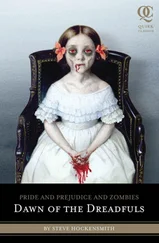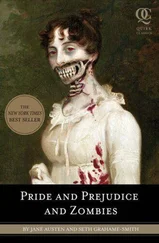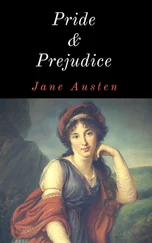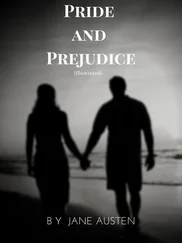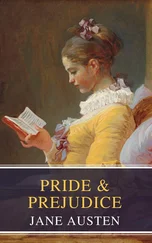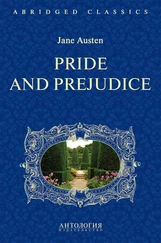Jane Austin - Pride and Prejudice
Здесь есть возможность читать онлайн «Jane Austin - Pride and Prejudice» — ознакомительный отрывок электронной книги совершенно бесплатно, а после прочтения отрывка купить полную версию. В некоторых случаях можно слушать аудио, скачать через торрент в формате fb2 и присутствует краткое содержание. Жанр: unrecognised, на немецком языке. Описание произведения, (предисловие) а так же отзывы посетителей доступны на портале библиотеки ЛибКат.
- Название:Pride and Prejudice
- Автор:
- Жанр:
- Год:неизвестен
- ISBN:нет данных
- Рейтинг книги:3 / 5. Голосов: 1
-
Избранное:Добавить в избранное
- Отзывы:
-
Ваша оценка:
- 60
- 1
- 2
- 3
- 4
- 5
Pride and Prejudice: краткое содержание, описание и аннотация
Предлагаем к чтению аннотацию, описание, краткое содержание или предисловие (зависит от того, что написал сам автор книги «Pride and Prejudice»). Если вы не нашли необходимую информацию о книге — напишите в комментариях, мы постараемся отыскать её.
Pride and Prejudice — читать онлайн ознакомительный отрывок
Ниже представлен текст книги, разбитый по страницам. Система сохранения места последней прочитанной страницы, позволяет с удобством читать онлайн бесплатно книгу «Pride and Prejudice», без необходимости каждый раз заново искать на чём Вы остановились. Поставьте закладку, и сможете в любой момент перейти на страницу, на которой закончили чтение.
Интервал:
Закладка:
happen. The world is blinded by his fortune and consequence, or
frightened by his high and imposing manners, and sees him only as
he chooses to be seen.”
“I should take him, even on _my_ slight acquaintance, to be an
ill-tempered man.” Wickham only shook his head.
“I wonder,” said he, at the next opportunity of speaking,
“whether he is likely to be in this country much longer.”
“I do not at all know; but I _heard_ nothing of his going away
when I was at Netherfield. I hope your plans in favour of the
——shire will not be affected by his being in the neighbourhood.”
“Oh! no—it is not for _me_ to be driven away by Mr. Darcy. If
_he_ wishes to avoid seeing _me_, he must go. We are not on
friendly terms, and it always gives me pain to meet him, but I
have no reason for avoiding _him_ but what I might proclaim
before all the world, a sense of very great ill-usage, and most
painful regrets at his being what he is. His father, Miss Bennet,
the late Mr. Darcy, was one of the best men that ever breathed,
and the truest friend I ever had; and I can never be in company
with this Mr. Darcy without being grieved to the soul by a
thousand tender recollections. His behaviour to myself has been
scandalous; but I verily believe I could forgive him anything and
everything, rather than his disappointing the hopes and
disgracing the memory of his father.”
Elizabeth found the interest of the subject increase, and
listened with all her heart; but the delicacy of it prevented
further enquiry.
Mr. Wickham began to speak on more general topics, Meryton, the
neighbourhood, the society, appearing highly pleased with all
that he had yet seen, and speaking of the latter with gentle but
very intelligible gallantry.
“It was the prospect of constant society, and good society,” he
added, “which was my chief inducement to enter the ——shire. I
knew it to be a most respectable, agreeable corps, and my friend
Denny tempted me further by his account of their present
quarters, and the very great attentions and excellent
acquaintances Meryton had procured them. Society, I own, is
necessary to me. I have been a disappointed man, and my spirits
will not bear solitude. I _must_ have employment and society. A
military life is not what I was intended for, but circumstances
have now made it eligible. The church _ought_ to have been my
profession—I was brought up for the church, and I should at this
time have been in possession of a most valuable living, had it
pleased the gentleman we were speaking of just now.”
“Indeed!”
“Yes—the late Mr. Darcy bequeathed me the next presentation of
the best living in his gift. He was my godfather, and excessively
attached to me. I cannot do justice to his kindness. He meant to
provide for me amply, and thought he had done it; but when the
living fell, it was given elsewhere.”
“Good heavens!” cried Elizabeth; “but how could _that_ be? How
could his will be disregarded? Why did you not seek legal
redress?”
“There was just such an informality in the terms of the bequest
as to give me no hope from law. A man of honour could not have
doubted the intention, but Mr. Darcy chose to doubt it—or to
treat it as a merely conditional recommendation, and to assert
that I had forfeited all claim to it by extravagance,
imprudence—in short anything or nothing. Certain it is, that the
living became vacant two years ago, exactly as I was of an age to
hold it, and that it was given to another man; and no less
certain is it, that I cannot accuse myself of having really done
anything to deserve to lose it. I have a warm, unguarded temper,
and I may have spoken my opinion _of_ him, and _to_ him, too
freely. I can recall nothing worse. But the fact is, that we are
very different sort of men, and that he hates me.”
“This is quite shocking! He deserves to be publicly disgraced.”
“Some time or other he _will_ be—but it shall not be by _me_.
Till I can forget his father, I can never defy or expose _him_.”
Elizabeth honoured him for such feelings, and thought him
handsomer than ever as he expressed them.
“But what,” said she, after a pause, “can have been his motive?
What can have induced him to behave so cruelly?”
“A thorough, determined dislike of me—a dislike which I cannot
but attribute in some measure to jealousy. Had the late Mr. Darcy
liked me less, his son might have borne with me better; but his
father’s uncommon attachment to me irritated him, I believe, very
early in life. He had not a temper to bear the sort of
competition in which we stood—the sort of preference which was
often given me.”
“I had not thought Mr. Darcy so bad as this—though I have never
liked him. I had not thought so very ill of him. I had supposed
him to be despising his fellow-creatures in general, but did not
suspect him of descending to such malicious revenge, such
injustice, such inhumanity as this.”
After a few minutes’ reflection, however, she continued, “I _do_
remember his boasting one day, at Netherfield, of the
implacability of his resentments, of his having an unforgiving
temper. His disposition must be dreadful.”
“I will not trust myself on the subject,” replied Wickham; “_I_
can hardly be just to him.”
Elizabeth was again deep in thought, and after a time exclaimed,
“To treat in such a manner the godson, the friend, the favourite
of his father!” She could have added, “A young man, too, like
_you_, whose very countenance may vouch for your being
amiable”—but she contented herself with, “and one, too, who had
probably been his companion from childhood, connected together,
as I think you said, in the closest manner!”
“We were born in the same parish, within the same park; the
greatest part of our youth was passed together; inmates of the
same house, sharing the same amusements, objects of the same
parental care. _My_ father began life in the profession which
your uncle, Mr. Phillips, appears to do so much credit to—but he
gave up everything to be of use to the late Mr. Darcy and devoted
all his time to the care of the Pemberley property. He was most
highly esteemed by Mr. Darcy, a most intimate, confidential
friend. Mr. Darcy often acknowledged himself to be under the
greatest obligations to my father’s active superintendence, and
when, immediately before my father’s death, Mr. Darcy gave him a
voluntary promise of providing for me, I am convinced that he
felt it to be as much a debt of gratitude to _him_, as of his
affection to myself.”
“How strange!” cried Elizabeth. “How abominable! I wonder that
the very pride of this Mr. Darcy has not made him just to you! If
from no better motive, that he should not have been too proud to
be dishonest—for dishonesty I must call it.”
“It _is_ wonderful,” replied Wickham, “for almost all his actions
may be traced to pride; and pride had often been his best friend.
It has connected him nearer with virtue than with any other
feeling. But we are none of us consistent, and in his behaviour
to me there were stronger impulses even than pride.”
“Can such abominable pride as his have ever done him good?”
“Yes. It has often led him to be liberal and generous, to give
his money freely, to display hospitality, to assist his tenants,
Читать дальшеИнтервал:
Закладка:
Похожие книги на «Pride and Prejudice»
Представляем Вашему вниманию похожие книги на «Pride and Prejudice» списком для выбора. Мы отобрали схожую по названию и смыслу литературу в надежде предоставить читателям больше вариантов отыскать новые, интересные, ещё непрочитанные произведения.
Обсуждение, отзывы о книге «Pride and Prejudice» и просто собственные мнения читателей. Оставьте ваши комментарии, напишите, что Вы думаете о произведении, его смысле или главных героях. Укажите что конкретно понравилось, а что нет, и почему Вы так считаете.


